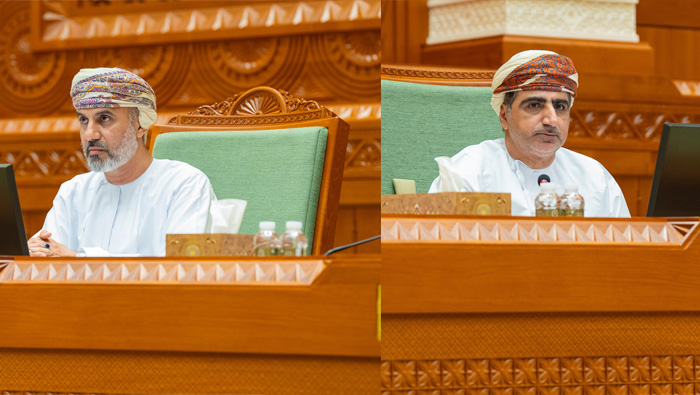
Muscat: The Shura Council convened its second regular session of the third ordinary meeting (2025-2026) of the tenth term (2023-2027) on Monday, under the chairmanship of Khalid Hilal Al Maawali, Chairman of the Council, with the attendance of Council members and Ahmed Mohammed Al Nadhabi, Secretary-General of the Council.
Election Results for Committee Chairs and Deputies
At the start of the session, the Council approved the final lists of the permanent committees’ memberships. Prior to the session, the committees held their meetings to elect their respective Chairs and Deputies.
The outcomes are as follows: Legislative and Legal Committee: head – Dr. Ahmed Ali Al Saadi; Deputy
– Yaqub Mohammed Al Harthi.
Economic and Financial Committee: Head – Ahmed Said Al Sharqi; Deputy – Abdul Aziz Rashid Al Hashmi.
Food and Water Security Committee: Head– Abdullah Ahmed Al Malik; Deputy – Ali Mohammed Al Alawi.
Public Services and Facilities Committee: Head – Hamoud Ahmed Al Yahyai; Deputy – Mansour bin Khalifa Al Siyabi.
Health and Social Committee: Chair – Mansour Zaher Al Hajri; Deputy –Abdullah Ali Al Hamhami.
Youth and Human Resources Committee: Head – Younis Ali Al Mandhari; Deputy – Sultan Humaid Al Housni.
Education, Scientific Research, and Innovation Committee: Head – Dr.Ali Nasser Al Harasi; Deputy – Jamal Ahmed Al Abri.
Tourism, Media, and Culture Committee: head – Abdullah Hamad Al Harith; Deputy – Ali Khalfan Al Hosni.
Approval of Permanent Committees’ Work Plans
The Council reviewed the work plans of the permanent committees for the third ordinary meeting of the tenth term.
Committee Chairs presented summaries of annual plans and proposed legislative initiatives, alongside suggested topics for consideration within each committee’s remit.
Members provided observations and recommendations aimed at enhancing legislative priorities and institutional coordination.
The Council approved the committees’ work plans, incorporating the members’ inputs, with committees set to commence work according to the established timelines.
The Shura Council’s permanent committees comprise eight committees:
Legislative and Legal; Economic and Financial; Food and Water Security; Health and Social; Education, Scientific Research, and Innovation; Public Services and Facilities; Youth and Human Resources; and Tourism, Media, and Culture.
Approval of Ministerial Briefing Axes
During the session, the Council approved the axes of ministerial briefings for the third ordinary meeting, pursuant to Article (69) of the Shura Council Law, which mandates the Council to determine the programme and discussion topics at the start of each term.
The adopted axes aim to enhance communication with the executive branch and discuss economic and social development priorities.
Discussion and Approval of the National Geospatial Data and Information Law
The session included a discussion of the report from the Public Services and Facilities Committee on the draft National Geospatial Data and Information Law, which aims to regulate the collection and use of geospatial data in line with modern technological developments, supporting evidence-based developmental planning.
Hamoud Ahmed Al Yahyai, Committee head, highlighted the committee’s comprehensive study of the draft law, consultations with academic experts from Sultan Qaboos University, and coordination with relevant military authorities to address technical and security aspects.
Members emphasised the importance of updating legal frameworks to align with technological progress and ensure institutional coordination in data collection and usage.
Following deliberations, the Council approved the committee’s report and referred the draft law to the State Council for completion of its legislative process.
Discussion and Approval of the Unified Industrial Organisation Law for GCC States
Ahmed Said Al Sharqi, head of the Economic and Financial Committee, presented the committee’s report on the Unified Industrial Organization Law for GCC States.
The committee conducted a detailed study of the law’s economic, regulatory, and technical aspects, considering its impact on Oman’s industrial sector and alignment with national legislation.
The session included extensive member discussions, who provided feedback to ensure the law balances regional integration with national development needs.
The Council concluded the study of the draft law, preparing it for the next legislative phase. The law supports legislative and economic cooperation among GCC countries, facilitates industrial integration, and promotes sustainable development in Oman and the region.
Discussion of the Economic and Financial Committee Report on Omani Business Competitiveness
The Council reviewed the Economic and Financial Committee’s report on Omani business competitiveness and local industry assessment.
The committee examined related legislation, consulted public and private sector stakeholders, and reviewed international best practices.
Recommendations aim to streamline investment procedures, stimulate industrial growth, and promote sectoral integration in line with Oman Vision 2040. The reports were referred for further study to enhance their recommendations.
Discussion of the Food and Water Security Committee Report on Agricultural Product Marketing
The session also included a discussion of the Food and Water Security Committee’s report on agricultural product marketing.
Abdullah Ahmed Al Malik, head of the Committee, outlined challenges facing Oman’s agricultural marketing sector and proposed practical solutions, including strengthening agricultural cooperatives, establishing digital marketing platforms, and improving storage, transport, and distribution mechanisms.
The committee’s study aims to empower farmers, enhance local product value, and ensure national food security in line with sustainable agricultural strategies.